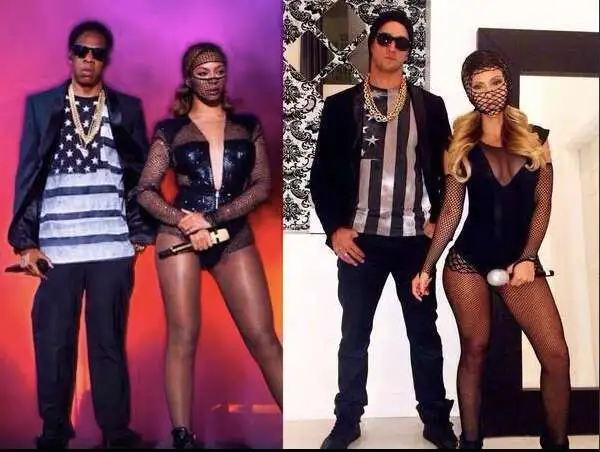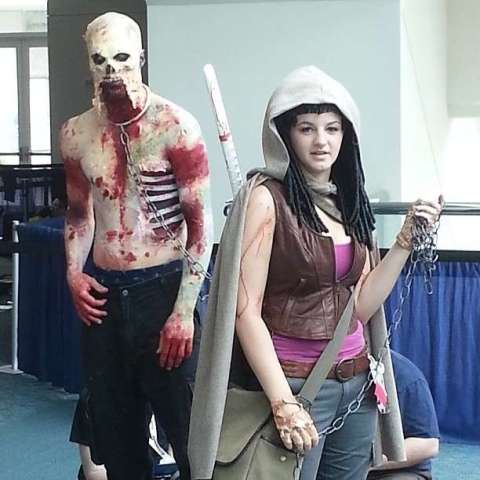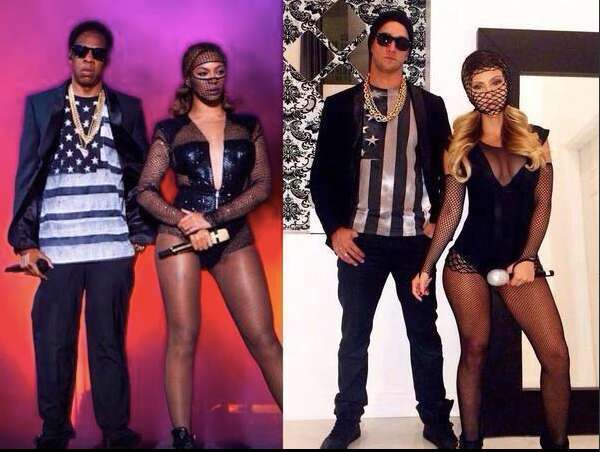This piece was originally published on Beacon. It was republished here with permission.
It comes up every Halloween. It comes up at every pop culture convention that includes cosplay. It comes up at any time costumes are appropriate (concerts, music videos, etc). The issue of what costumes are or aren’t racist.
A while back, I saw an article bouncing around my social media feeds – “8 Racist Halloween Costumes White People Need to Stop Wearing” – and while I disagree with a couple of small points, the overarching message is sound, and I love that it provides alternative costumes that can be worn using some of the same elements of the offensive costumes.
However, there’s one part of this article I definitely don’t agree with:
3. Any black celebrity/stereotype
No afro wigs, brown face paint, or dressing up as famous black people if you are not black. DON’T DO IT. White people dressing up as caricatures of black people has a long and racist history, called blackface and minstrelsy. White people would don blackface and travel in singing and dancing groups, the entire point of which was to mock black people. Click here to learn more about the history of blackface.
There are thousands of famous white people you could dress up as, so no, Braydon Campbell, there is absolutely no reason on earth that you need to dress up as Tupac Shakur.
INSTEAD: Literally any white celebrity, dead or alive. There are a tonne of them.
Black celebrity / black stereotype. These are two completely separate issues. I agree with not dressing as caricatures of black people (or any PoC). I agree with not painting your skin. After all, skin color is not a costume, and unless you’re dressing as someone with a non-human skin tone (ie: a fantasy character with blue/red/purple/gold/green skin), there’s absolutely NO reason to paint your skin in the name of a costume. Plenty of black women dress up as Wonder Woman without painting their skin white. Plenty of darker-skinned Latinas dress up like Princess Leia. Why would a white person feel the need to darken their skin? And why would they possibly think that’s OK?
Especially considering that there are white people who’ve done it right! Who’ve managed to dress as characters of color, or as celebrities of color completely effectively without descending into black-face.
This young woman at a convention manages to evoke Michonne from The Walking Dead without painting her skin at all. She is wearing a costume, not a race:
The white couple on the right chose a distinctive look when dressing as Jay-Z and Beyonce, so that the costumes would speak for themselves.
It is possible for white people to dress as characters of color, or as celebrities of color – but if the only thing that makes the character/celebrity distinctive to you is their skin color? I’d rethink your reasons behind the costume and try to be a bit more creative.
And why are the costumes you choose so important? I know it probably seems like such a small thing. Especially when all you’re trying to do is have some fun, right? And why is it OK for people of color to dress like white characters when it’s not OK for white people to wear a costume from another person’s culture? Isn’t that “reverse racism” or something? And anyway, me wearing that costume isn’t racist!
I’ll take those points one at a time:
1) Why is it OK for people of color to dress like white characters when it’s not OK for white people to wear a costume from another person’s culture?
The reason why a lot of people think it’s less OK for a white person to be a character of color than it is for a person of color to be a white character is that there are so many white characters to choose from. A white person has a wide selection when it comes to dressing as someone who looks like them. They have the luxury of choosing ANYONE, so when they choose one of the few characters of color, it makes PoCs cringe. Because too often, PoCs have to dress as white characters. First, I’m sure because they like them, but second, because they don’t have much of a choice. Unless they want to be one of 10 characters* every year and at every convention.
In addition, a white person appropriating a culture or a race in the name of a costume is racist.
*record scratch*
“What?!” I hear you scream. “No it’s not!”
Which leads to the second point:
2) Isn’t that “reverse racism” or something? And anyway, me wearing that costume isn’t racist!
A big problem is that people misuse the word racist, throwing it around willy-nilly. Anyone can be prejudiced or a bigot. There are plenty of blacks, Latinos, and Asians that have pre-conceived notions about other minority groups, or about white people, which leads to hatred or mistreatment. No one is saying that’s not the case. But racism, specifically, has to do with a power dynamic.
rac·ism (ˈrāˌsizəm) noun: The belief that all members of each race possess characteristics or abilities specific to that race, especially so as to distinguish it as inferior or superior to another race or races.
The second part of that definition is especially important. It’s not just I don’t like this race, but it’s ALSO I think my race is superior to other races. It’s both of those things together. So, anyone who believes that their race/ethnic group is superior to other races/ethnic groups – not just that they don’t like them, but that they feel superior to them – is a racist. And any action that perpetuates a system where one race is for all intents and purposes superior to another legally and societally, is a racist action. And no, PoCs can’t be racist, because they never have the power in any situation in this country, because the United States systemically favors white people.
And white people get defensive when they hear that word, I know. But an action can be racist without a person being racist. Is the action always malicious or intentional? Of course not. But it is racist. And it’s important to make the distinction between a racist person, and a racist action. So important, in fact, that I’m going to direct you to one of my favorite explanations of that importance on YouTube. Go ahead and watch the video. This article will still be here when you’re done.
So, with regard to costumes, it does the discussion a disservice when people say things like “this cosplayer is racist for painting her face black to dress like Michonne!” Instead, the conversation should be, This cosplayer’s costume is racist. And how is that?
As I said, racism is about a power dynamic. One group has to be superior and another group has to be inferior. In the case of costumes, white people have the power, because there are more white characters to choose from. And that’s the case, because PoCs don’t have as much representation in pop culture as they should. There are more white celebrities to choose from. And that’s the case, because it is more likely that a white person will have the advantages that will allow them to make the choices that will lead to them being a celebrity (they’re in demand to play all those white characters, for starters).
That freedom and variety of choice is the power in this situation. And so, when people talk about costume choices as racist, it’s not to say that the white people who do this are horrible or hate minorities. It’s to say that the act of choosing to appropriate cultural garb as a “costume,” or to paint your skin black or brown, or to apply make-up to your eyes to make yourself look Japanese or Chinese perpetuates a racist society by further appropriating things that have already had a difficult time surviving to begin with. It’s racist because, even with all the freedom of choice in the world, and even with the knowledge that your choice may hurt members of an entire community, you’re choosing to take from someone else, rather than making use of the myriad options you already have.
Meanwhile, when you say “white,” it really means a lot of things in the United States. You could be descended from anywhere in Europe, and your history is full of conquests. But also, the cultures are diluted. White people in America are generally “mutts” and don’t strictly adhere to any particular cultural background. Most white people I know are “part English/Irish/German/Scandinavian” and don’t particularly identify with any one. And PoCs don’t want to see that happen to their cultures! They don’t want to be assimilated! They don’t want these things that are important to them to be so diluted as to be without real meaning!
So, while yes – technically anyone has the “right” to dress any way they want, I would just ask you to seriously think about why you so desperately need to be a Geisha, or an “Indian” Chief, or a Samurai, or a Mexican in a Sombrero? What is it about those costumes that you can’t get from any other costume? And why are you fighting so hard for your right to wear that when you have so many other options, even if it means that you’re hurting a bunch of people? Of course, not everyone in every minority group will be as offended by every one of these things. But there’s a not-insignificant number of people who will be.
So your reasons for selecting that costume better outweigh causing people pain.
Am I making you feel guilty? Good. Maybe that will also make you stop and think.
And if I’m not, well, enjoy being someone who hurts people for no reason. We’ll see how far that gets you.
Until next Halloween…
*This is not an accurate number. I didn’t count every single character in existence, but you know what I mean, dammit.
—Please make note of The Mary Sue’s general comment policy.—
Do you follow The Mary Sue on Twitter, Facebook, Tumblr, Pinterest, & Google +?











Published: Oct 6, 2015 04:31 pm